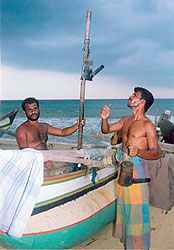Fisheries and Coordination
 The livelihoods of the people of Ampara District were immensely affected by the tsunami, and many are still undergoing severe hardships. Fortunately, a great number of people have been compensated for their losses by INGOs, but major challenges remain in coordinating these efforts to address the specific needs of this region.
The livelihoods of the people of Ampara District were immensely affected by the tsunami, and many are still undergoing severe hardships. Fortunately, a great number of people have been compensated for their losses by INGOs, but major challenges remain in coordinating these efforts to address the specific needs of this region.For example, INGOs have issued a great number of boats and canoes to tsunami victims, but these crafts have in many occasions been delivered to victims who were not actually fishermen and who did not posses any boats or canoes prior to the tsunami. In the meantime, there are some actual fishermen who are in dire need of replacement boats to resume their livelihoods, but who have yet to be compensated for their losses.
Another concern is with INGOs distributing boats without either fishing gear (e.g. nets, etc.) or outboard motors, making resumption of livelihood activities difficult. In some cases when outboard motors have been supplied, fishermen say they have too little horsepower to withstand the rough seas of Sri Lanka’s east coast. In other instances, fishing nets have been provided but are not to the requirements of the fisheries here, or fibreglass boats are supplied which are of too low quality to be ocean-worthy. An immediate need remains for search boats to help locate and aid boats lost at sea. At present, search boats are hired from the south at great expense.
The generous contributions to Ampara District mean that many fishermen who possessed no boats of their own prior to the tsunami, and who were working on boats owned by other individuals, have now obtained their own boats from some INGOs. However, even this situation is not without complications, as there is now a shortage of fishermen to fully man the boats owned by all the individuals.
In terms of developing the industry further, the fisheries in Ampara District use two main methods to catch fish (although there are various methods). In the first case, the fishermen go deep into sea in the evening, cast their nets, stay on the ocean overnight, and in the morning return to the shore with whatever fish have been caught in their nets. In the second case, roughly 35-45 people get together onshore and locate nearby fishes. They then cast their nets using a canoe and pull the nets back together with whatever fishes have been caught. Although these methods are widely practiced locally, some fishermen hearing of more modern fishing techniques wish to learn about them. Unfortunately, there are no facilities available for such training.

The foregoing concerns from local fishermen and others are evidence that, even with so much good work already accomplished, we are now at the stage of reconstruction where coordination between INGOs and other organizations, as well as communications with the beneficiaries, must be further strengthened to provide for the greatest success in rebuilding Ampara.
<< Home